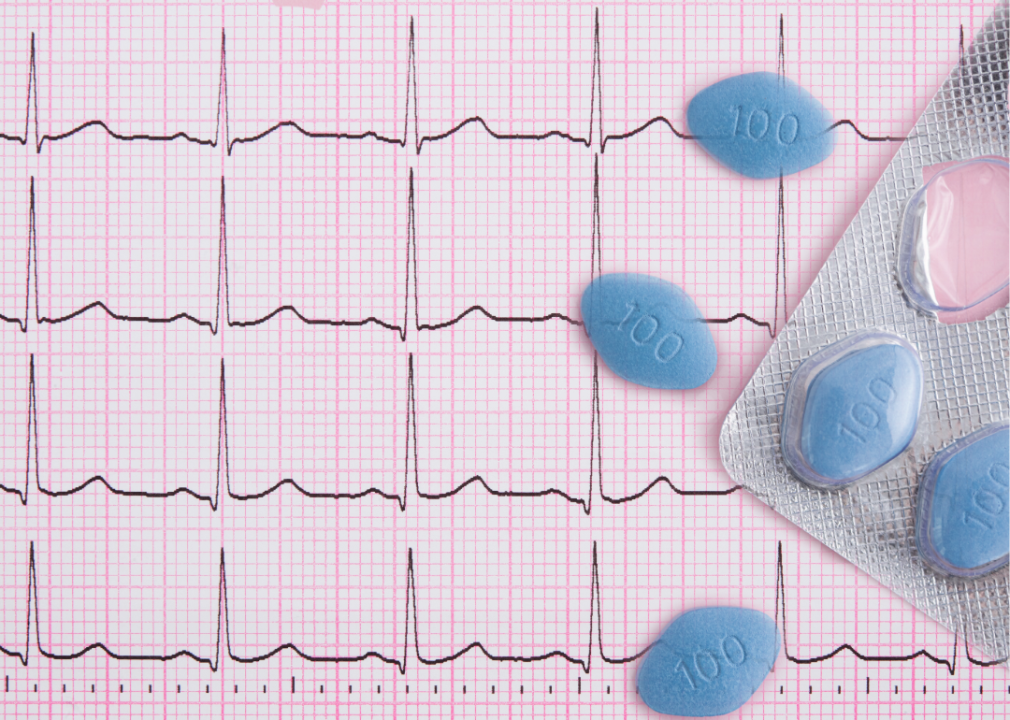New research suggests a beneficial link between erectile dysfunction medication and heart health
Published 6:30 pm Wednesday, April 24, 2024
New research suggests a beneficial link between erectile dysfunction medication and heart health
A new study published in The Journal of Sexual Medicine looked at the effects of taking erectile dysfunction (ED) medications on the risk of serious cardiovascular (CV) conditions, like heart attack and stroke. The medications studied are PDE5 inhibitors: sildenafil (Viagra), tadalafil (Cialis), vardenafil (Levitra), and avanafil (Stendra), all approved for the treatment of ED.
Key Points
- The study demonstrates a very clear link between the use of ED medications and lower risks of major CV events like heart attacks and strokes.
- Findings suggest that PDE5 inhibitors may truly exert a cardioprotective effect. This hints at a cause-effect relationship.
- Men who are hesitant to take PDE5 inhibitors for ED should feel confident that they’re not associated with heart attacks or strokes.
What We Already Know About PDE5 Inhibitors and Heart Health
In the late 1980s, Pfizer was investigating whether a new drug that inhibited the action of an enzyme called PDE5 might be effective for the treatment of high blood pressure and heart disease. Men in the study reported an unusual side effect—they noticed an improvement in the strength of their erections. About 10 years later, this fortuitous discovery led to the approval of sildenafil for the treatment of ED and ushered in a new era of drug development and progress in sexual medicine.
The early research on PDE5 inhibitors for heart disease was also fruitful. Sildenafil is one of the treatments for pulmonary hypertension (a serious type of high blood pressure affecting the lungs and heart).
Research has also shown that PDE5 inhibitors can improve clinical outcomes and exercise capacity in patients with heart failure and may even reduce the risk of developing heart failure after a heart attack.
It’s no surprise that this medication class effectively treats CV conditions and ED. PDE5 inhibitors work by relaxing blood vessels, increasing blood flow, and supporting endothelial (heart and blood vessel lining) function—all necessary for optimal heart health and erectile function.
The New PDE5 Inhibitor Study: Heart Health Outcomes on a Larger Scale
This large study involved the review and analysis of medical and pharmacy records of close to 675,000 men without CV disease. Their pharmacy records allowed a comparison of those taking vs. not taking one of the PDE5 inhibitors in the past year.
The researchers wanted to know if men who take PDE5 inhibitors have fewer serious CV events (e.g., heart attack, stroke).
The Compelling Results
The group of men taking PDE5 inhibitors had significantly fewer serious CV events (by 13%), fewer deaths from CV events (by 39%), and fewer all-cause deaths (by 25%) compared to men not taking one of the medications. Findings in those with CV risk factors, like smoking or high cholesterol, were similar.
They also identified a dose-response effect. In other words, participants taking the highest dose of PDE5 inhibitors compared to those on the lowest dose had 55% fewer CV events (e.g., heart attack, stroke) and 49% fewer all-cause deaths.
Some Study Limitations
The study, like most, does have some limitations. Due to the study design, researchers couldn’t account for every factor that may have affected the results. But, they did match the two groups of patients (those taking vs. not taking PDE5 inhibitors) as closely as possible.
It’s difficult to separate the overall health of the men in the study from the effects of the medication. Men who are able to engage in sexual activity may be healthier in general in ways that are difficult to capture with statistics, i.e., they may be less likely to develop CV disease.
Additionally, there wasn’t an independent measure of sexual activity—it may be that the sexual activity itself contributed to the positive study results.
Why Is This Important?
There are several reasons why the study results are important.
- The large size of the study (close to 675,000 participants), strongly supports the association between PDE5 inhibitors and decreased risk of serious CV events.
- The study results further debunk the myth that taking PDE5 inhibitors increases the risk of conditions like heart attack and stroke. They may, in fact, be cardioprotective. The serious CV events that rarely occur during sexual activity are related to the physical strain and exercise of sex—not the ED medication.
- The study doesn’t prove a direct cause-effect relationship. However, it does demonstrate a very clear link between the use of ED medications and lower risks of major CV events, such as heart attacks and strokes.
In addition, the dose-response findings are suggestive that PDE5 inhibitors may truly exert a cardioprotective effect. This hints at a cause-effect relationship, which is absolutely plausible based on what is known about how these medications work inside the body.
Although the jury is still out, there appears to be a real underlying cause-and-effect relationship with the use of ED medications and lower risk of major CV events. The only way to prove that, though, is through high-quality clinical trials. Researchers have suggested randomized controlled trials (RCTs) for further study.
![]()






